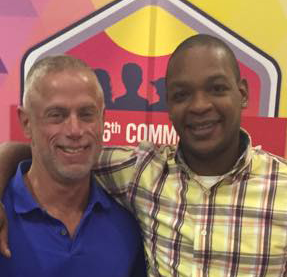Black Voices: Lessons Learned Over Lunch with my Mentor: First Annual Viiv Youth Summit
Content From: Anthony Roberts, Jr., Vice-Chair and Communications Chair, Young Black Gay Men’s Leadership Initiative•Published: November 13, 2014•4 min read
Topics

Panel discussions and workshops were designed to equip us with new skills and techniques that we can apply to the work we are already doing in the field. At the conclusion of the Youth Summit, we created a Youth HIV ManifestoExit Disclaimer, and I had the honor of narrating the video. The Youth HIV Manifesto allowed us to collectively and individually share our thoughts on awareness, stigma, healthcare, and research.
Even as the Viiv Youth Summit concluded, my learning continued. Before attending the Summit, I filled out a questionnaire that allowed me to express how I wanted to evolve in my career by connecting me to a mentor. As a result, I was honored to connect with Jeff Berry, the Director of Publications for the Test Positive Aware Network (TPAN) in Chicago. Jeff also serves as TPAN’s editor for their print and digital publication, Positively Aware, a bimonthly HIV/AIDS publication with a subscription and bulk circulation of 100,000 copies per issue. Last year, Jeff blogged for HIV.gov on a photo-sharing project, A Day with HIV. Having a mentor can help you assess your strengths and weaknesses and develop skills for success and a long-range career plan. Jeff’s extensive experience in this field complemented my interest in marketing and communications. I was excited to have Jeff as a new mentor and couldn’t wait to formally meet him.
Over our lunch conversation, Jeff shared that he tested positive for HIV in 1989. At that time, there was not a plethora of information readily available about HIV and AIDS, and the Internet was in its infancy. He found out about TPAN and began reading their print newsletter and later joined the publications staff. Here are some tips and life lessons Jeff shared about his experiences thus far in working for a niche media HIV/AIDS outlet.Anthony Roberts, Jr.: “How can traditional media outlets targeted for men who have sex with men (MSM) and HIV/AIDS evolve to use new media and technology to reach audience members?”
Jeff Berry: “It’s important to have youth leaders sitting at the table, on your boards, and as staff members who can provide input and are integral in the implementation of your organization’s plans and initiatives. I will admit that I have known some small or nonprofit organizations that are creatures of habit and are slow to change and adapt. Additionally, some lack the capacity and resources dedicated to reach this demographic.”
Anthony Roberts, Jr.: “How do you feel the media has shifted its messaging about HIV/AIDS over the years?”
Jeff Berry: “I believe the HIV/AIDS community is currently doing a great job on promoting awareness about prevention and treatment of Hepatitis C and PrEP. In the past, more emphasis was placed on disclosure, opportunistic infections, and how to maintain your health while being HIV+.”
Anthony Roberts, Jr.: “Do you think that mass media has done enough to inform the public about the HIV/AIDS epidemic? Why or why not?”
Jeff Berry: “I don’t believe enough coverage is made on mainstream media about the epidemic. I think it’s because of the 24/7 news cycle, and most coverage is given to breaking news.”
Anthony Roberts, Jr.: “What messaging formats and words do you think translate well with the MSM community?”
Jeff Berry: “Definitely stories or articles with a personal connection and that highlight those living with the virus have been through the experience. Also, information about topics such as new HIV/AIDS drugs, new treatment methods, civil rights issues, and sex workers.”
Anthony Roberts, Jr.: “What advice do you have for publishers of content/authors to frame the messaging to the MSM population?”
Jeff Berry: “It’s important to know your audience and to be as authentic as possible. Try not to sensationalize content and don’t be afraid to go in depth once in a while. A general rule of thumb is to always check your sources and vet your content.”
Anthony Roberts, Jr.: “What do you think are some engagement tactics or methods that digital publications can use to interact with audience members?”
Jeff Berry: “Using online readers’ polls and somehow integrating them into your publication is a great way to gauge how your readers feel about issues. However, it’s best to allow the poll to use open-ended questions – if you do use Yes/No questions, be sure to include a comment field. Also, remember that not everyone has access to the Internet. Print is still needed, but print publications need to be strategic about how to place themselves in the digital world. There’s always a place for print but what does that place look like when compared to digital?”
As I evolve in my career, Jeff’s words of wisdom are nuggets of knowledge that I will keep in mind. I intend on employing them in my HIV/AIDS advocacy and outreach efforts. I encourage others working in the HIV/AIDS field to do the same.